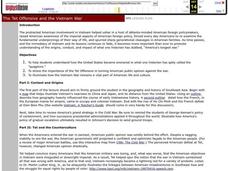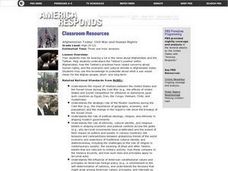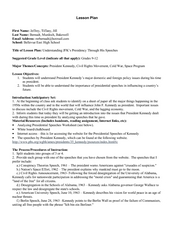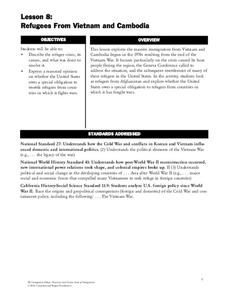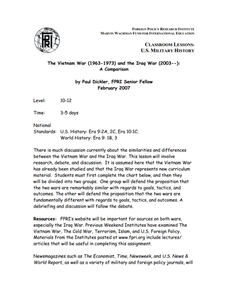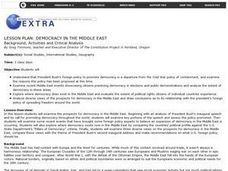Curated OER
History of Modern Cuba
Set the context for the often-strained relationship between the US and Cuba with this informative and entertaining presentation. From political cartoons to photographs of Fidel Castro and Fulgencio Batista, as well as heartbreaking...
Curated OER
The Tet Offensive and the Vietnam War
Learners discover how the United States became involved in the Vietnam War, the importance of the Tet Offensive in turning American public opinion against the war, and how the Vietnam War is still a part of American life and culture.
John F. Kennedy Presidential Library & Museum
Military Advisers in Vietnam: 1963
How did the beginning of the Vietnam War factor into the Cold War with the Soviet Union? As part of a study of American involvement in Vietnam, class members read a letter address to President Kennedy and his response in which he...
Curated OER
Afghanistan Today: Civil War and Human Rights
Students examine the relationship between the United States and the Soviet Union during the Cold War. They analyze the role of religion and cultural identity in shaping governments. They also examine the United States foreign policy.
University of California
Anti-Communism at Home
Have you ever been accused of something without cause? The sixth installment of an eight-part series asks scholars to create a museum exhibit on the anti-communist activities in the United States at the start of the Cold War. To make...
Curated OER
The Cold War Warrior Defending: The Moral Beacon of the World
Students identify President Reagan's domestic and foreign policy, describe America's attitude toward communism, list characteristics which endeared Reagan to the American people, and explain why some Americans spoke out against Reagan's...
Curated OER
Understanding JFK's Presidency through his Speeches
Students reflect and discuss the major events that happened in the United States in the 1950's and 1960's. In this U.S. History lesson, students read and analyze the famous speeches during this time frame, then complete a worksheet that...
DocsTeach
Nixon Visits China: The Week that Changed the World
Sometimes one trip shakes up the entire world. When President Richard Nixon traveled to China, he defied international and political boundaries. Nixon was the first American president to visit mainland China, which was a communist nation...
Curated OER
The Bush Doctrine
Learners analyze the Bush Doctrine and its effects on foreign policy. In this foreign policy lesson, students read and discuss the Bush Doctrine. Learners research and debate on whether or not the Bush Doctrine should be part of U.S....
Curated OER
Multiple Perspectives on the Korean War
Learners interpret historical evidence presented in primary and secondary resources. In this Korean War lesson, students examine and analyze primary sources regarding U.S. involvement in the Korean War.
Constitutional Rights Foundation
Refugees From Vietnam and Cambodia
The United States may have pulled its troops from the Vietnam War in 1973, but the conflict was far from over for the citizens living in Asia at the time. An informative resource lets learners know about the wave of over 220,000...
Curated OER
Troop Surge vs. Redeployment
Students explore American foreign policy regarding the war in Iraq. In this Iraq debate lesson, students examine videos and documents about the pros and cons of keeping American troops in Iraq.
Curated OER
The Tet Offensive and the Vietnam War
Students comprehend how the United States became involved in what one historian called the quagmire. Students identify and analyze the importance of the Tet Offensive in turning American public opinion against the Vietnam War. Students...
Foreign Policy Research Institute
The Vietnam War (1963-1973) and the Iraq War (2003---): A Comparison
If you are planning a unit on military history that includes a comparison between the Vietnam War and the Iraq War, this resource may be useful. It lists possible sources for pupils to use to complete the graphic organizer which prepares...
Curated OER
Police Action: The Korean War, 1950-1953
Pupils explore why the United States became involved in the war in Korea. They discuss the confict between Truman and MacArthur, culminating in the latter's dismissal from command. They identify on a world map foreign countires...
Curated OER
The Arms Race - From the Beginning to the End
Ninth graders focus on the political and technological developments of the Cold War. They, in groups, read and summarize the speech they are given. They should provide a short presentation based on their interpretation.
Curated OER
If We Knew Then What We Know Now -- Cuban Missile Crisis (Background)
Students examine the background of the Cuban Missile Crisis. Using the foreign policy decision-making process, they simulate and elaborate the processe involved. They identify the causes of the misconceptions that plagued the U.S.-Cuba...
Curated OER
The Cuban Missile Crisis-Three Perspectives
Students examine the viewpoints of the major players in the Cuban Missile Crisis. In groups, they research the topic and organize the information into a presentation. They evaluate the decisions made at the time. They also discover the...
Curated OER
Democracy in the Middle East
High schoolers explain that President Bush's foreign policy to promote democracy is a departure from the Cold War policy of containment, and examine the reasons this policy has been proposed at this time.
Curated OER
refugees From Vietnam and Cambodia
Tenth graders explore the massive immigration from Vietnam and Cambodia. In this World History instructional activity, 10th graders examine the crisis that led to this immigration. Students participate in a debate on whether the United...
Curated OER
Vietnam: A Divided Nation
Eleventh graders examine events leading up to and during the Vietnam War. They research assigned topics utilizing interviews, Powerpoint presentations, timelines, and collages in their presentations.
Curated OER
The Berlin Wall
Students enter the classroom and observe a wall that is set up with desks, bookshelves, or anything else available. to create a barrier that they cannot cross during the class. The class then is divided into East and West Berlin with the...
Curated OER
At What Price the Truth?
Students read President Kennedy's speech to the nation on October 22, 1962. Using the text, they identify the deception by the Soviets. In groups, they create a comip strip showing what they believe might have happened had there been no...
Harry S. Truman Library & Museum
Marshall Plan: Convince the American People
This is an excellent resource for US history classes, especially AP history. After learning some background on the Marshall Plan, the class, divided into two groups, researches opposing positions on this aid program. Groups read and...



